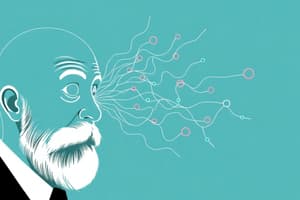Podcast
Questions and Answers
According to Freud, which instinct seeks our demise and dissolution?
According to Freud, which instinct seeks our demise and dissolution?
- Superego
- Thanatos (correct)
- Ego
- Id
During which stage of development do children create defense mechanisms to manage the pressures from the id and the superego?
During which stage of development do children create defense mechanisms to manage the pressures from the id and the superego?
- Reality principle stage
- Psychosexual stages (correct)
- Ego development stage
- Transference stage
Which structure of personality is responsible for dealing logically and rationally with the world, according to Freud?
Which structure of personality is responsible for dealing logically and rationally with the world, according to Freud?
- Superego
- Libido
- Ego (correct)
- Id
What is the deterministic approach considered by psychoanalysis due to its view of consciousness as the 'tip of the iceberg'?
What is the deterministic approach considered by psychoanalysis due to its view of consciousness as the 'tip of the iceberg'?
What technique in psychoanalysis involves the interpretation of both the manifest content and latent meaning of dreams?
What technique in psychoanalysis involves the interpretation of both the manifest content and latent meaning of dreams?
According to Freud, the death instinct (Thanatos) is associated with cooperation, collaboration, and harmony with others.
According to Freud, the death instinct (Thanatos) is associated with cooperation, collaboration, and harmony with others.
Psychoanalysis is not considered a deterministic approach because consciousness is considered the 'tip of the iceberg.'
Psychoanalysis is not considered a deterministic approach because consciousness is considered the 'tip of the iceberg.'
Freud postulated that all of one’s psychic energy becomes focused on differing erogenous zones that correspond to the unfolding biological development of the child.
Freud postulated that all of one’s psychic energy becomes focused on differing erogenous zones that correspond to the unfolding biological development of the child.
The therapist does not attempt to build a transference relationship in the procedure of psychoanalysis.
The therapist does not attempt to build a transference relationship in the procedure of psychoanalysis.
Freud's daughter, Anna Freud, did not identify several defense mechanisms that unconsciously help the individual cope with anxiety.
Freud's daughter, Anna Freud, did not identify several defense mechanisms that unconsciously help the individual cope with anxiety.
What is the collective unconscious in Jungian therapy?
What is the collective unconscious in Jungian therapy?
In Jungian therapy, what does the shadow represent?
In Jungian therapy, what does the shadow represent?
According to Adlerian therapy, what is the significance of private logic?
According to Adlerian therapy, what is the significance of private logic?
What creates a complex, according to Jungian therapy?
What creates a complex, according to Jungian therapy?
What does teleology, according to Adlerian therapy, emphasize?
What does teleology, according to Adlerian therapy, emphasize?
Flashcards are hidden until you start studying
Study Notes
Psychodynamic Theory
- Sigmund Freud (1856-1939) dominated the psychodynamic field for almost half a century.
- Psychodynamic approaches share common elements, including:
- The unconscious and conscious affecting personal functioning in deeply personal and dynamic ways.
- Early child-rearing practices as important in personality development.
- Examining the past and its dynamic interaction with conscious and unconscious factors in therapy.
Psychoanalysis
- Developed by Sigmund Freud, a trained physician.
- Steeped in biological determinism, emphasizing instincts and drives affecting behavior.
- Parenting styles within the first five or six years of life interact with instincts and inherent personality structures to produce one's personality.
- Freud proposed the concept of instincts, including the life instinct (Eros), which meets basic needs for love, intimacy, sex, and survival.
Analytical Psychology (Jungian Therapy)
- Developed by Carl Jung, a Swiss psychiatrist and psychoanalyst.
- Departed from Freud's pessimistic, deterministic view of human nature and childhood sexuality.
- Jung believed individuals can become conscious of unconscious forces and integrate them into a healthier way of living.
- Jung's theory of personality includes:
- Unique psychological types, including attitudes of extraversion and introversion.
- Mental functions of thinking, feeling, sensing, and intuiting.
- Eight cognitive functions influencing perception and information processing.
- Each individual has a dominant function shaping their personality.
- Jung's theory is closely related to the Myers-Briggs Type Indicator (MBTI), a psychological assessment tool used to identify an individual's personality type.
Studying That Suits You
Use AI to generate personalized quizzes and flashcards to suit your learning preferences.




